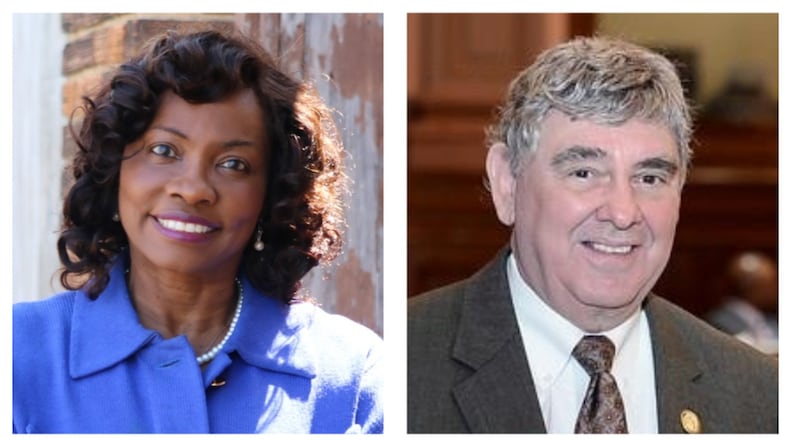Democrats are trying to flip the last seat in the Georgia House of Representatives where a Republican is representing a majority-black district.
The district has been held for 36 years by state Rep. Gerald Greene, who was originally a Democrat but switched to the Republican Party in 2010. He faces Democrat Joyce Barlow, who says it's time for a change to a candidate who more closely reflects the district.
Of the 49 majority African-American House districts in Georgia, all but one is represented by a Democrat. Greene, whose district runs from Albany to Alabama, is the only elected Republican in a mostly black House district. There are 180 House districts total, 114 of which are held by Republicans.
Greene, a retired teacher, said his district needs his seniority as a member of Georgia's majority party to help bring home money and programs to rebuild from the devastation of Hurricane Michael. Much of House District 151 has been declared a disaster area, making residents eligible for individual assistance grants for temporary housing, home repairs and low-cost loans to cover uninsured property losses.
“It doesn’t matter if you’re a Democrat, Republican or independent. If you’re not at the table, you’re not going to have a voice that’s necessary to take care of your people,” the Cuthbert Republican said. “As long as you meet the needs of the people, I think they will remember those things.”
But Barlow, a registered nurse and the CEO of a home health care company, said Greene no longer represents the ideals of the community since becoming a Republican. The district is 55 percent African-American; Barlow is black and Greene is white.
“It is a Democratic district being served by a Republican, and a lot of people feel like they’re being totally ignored,” Barlow said. “They don’t have the jobs. The economy is failing. When you go to those downtowns — or what was downtown — you’d be like, ‘Wow, how are the people surviving here? What’s been done?’ ”
The large and rural district, with a poverty rate of about 30 percent, became the center of national attention this fall over a proposal to close almost all voting precincts in Randolph County just weeks before the Nov. 6 general election.
Both Greene and Barlow opposed the precinct closures and joined a crowd of residents in August when the county elections board voted down the proposal, which would have made it harder for voters to get to the polls.
Greene said he’s politically moderate, more focused on providing for the area than on nationally divisive issues. Among his accomplishments, he lists his support for the completion of U.S. 27 through Cuthbert, the recruitment of Silicon Ranch Corp. to invest $89 million in two solar projects in Bluffton and the reopening of a juvenile justice facility in Terrell County.
Barlow said Greene’s results are insufficient from someone who’s a member of the state’s Republican leadership as chairman of State Properties Committee and a member of the Appropriations, Rules and Economic Development committees.
There’s also the matter of an incident in which Greene was shot in the leg last year during a robbery outside Foxes Cinema, an adult entertainment store in Columbus.
Greene has said he was held up, handed over his iPhone and was shot when he resisted giving his wallet full of checks made out to the Red Cross for storm relief. He said the shooting motivated him to support law enforcement and crime victims. No one was arrested, and a Columbus police report said the case remains an open investigation.
Bobby Jenkins, the chairman of the Randolph County Democratic Party, said Greene has become complacent.
“All he’s going to do is toe the party line. Whatever they say, he goes along with it,” Jenkins said. “He’s gotten a little passive. We need somebody more in tune with the needs of the people.”
One of Greene’s supporters, Cuthbert Mayor Steve Whatley, said his party switch eight years ago positioned him to remain relevant as a member of the majority.
“He did that in an effort to be more effective for our area,” Whatley said. “Obviously, we’re in a depressed county, so he’s been very instrumental in legislation for rural Georgia.”
As in many parts of the state, greater access to hospitals and health care services is a significant issue in the race.
Unlike most other Republicans, Greene said he supports expanding Medicaid, the public health program that provides care to the poor and disabled. Twice in 2014 the House voted to change state law to make it harder to expand Medicaid. Greene was excused from voting both times.
Barlow said Greene should have used his position of Republican power to push for a vote on Medicaid expansion.
“He hasn’t done anything to promote Medicaid expansion. He could have reached out to the governor and his other Republican partners to talk with them and say, ‘Look, my district is suffering,’ ” Barlow said. “You don’t just shrug your shoulders or walk out the door.”
Greene said economic development and rural health care improvements take time. In the meantime, he supports tax credits for donors to rural hospitals — a Republican alternative to Medicaid expansion — and greater use of telemedicine.
He said the district doesn’t need a change in the General Assembly.
“If something’s not broken, why try to fix it?” Greene said. “There’s no doubt that we are poor, but we are working hard every day, and it’s easy to sit back and be a Monday morning quarterback and tell us what we’re doing wrong.”
3 DAYS TO GO
The Atlanta Journal-Constitution’s election reporting is focused upon providing you with a deep understanding of the candidates, the key issues and what’s motivating Georgia voters. We are covering each race from all angles, giving equal weight to the candidates as you prepare to choose.
We are three days away from the Nov. 6 election.
About the Author
Keep Reading
The Latest
Featured




